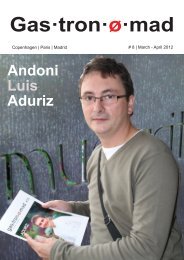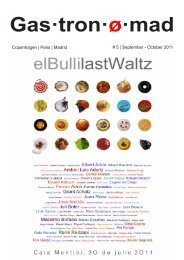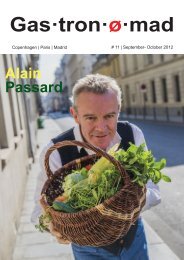Gastronomad #8 March - April 2012
You also want an ePaper? Increase the reach of your titles
YUMPU automatically turns print PDFs into web optimized ePapers that Google loves.
BØN·APPETIT<br />
What about the carbon footprint?<br />
When speaking locally we are<br />
always talking about “carbon footprinting”<br />
because the commonly<br />
held view is that locally produced<br />
products don’t pollute and those<br />
products that come from far away<br />
do! In Spain you can buy ecological<br />
asparagus from Peru but which, by<br />
this standard are not ethical because<br />
they have travelled.<br />
We are in a world in which you<br />
have to choose. It’s that simple.<br />
Transport consumes fossil fuels.<br />
It is however temporary. Thanks to<br />
advances in science, in fifty years<br />
it will not.<br />
Qu’en est-il de l’empreinte carbone?<br />
Quand on parle de produits locaux<br />
on parle toujours de «l’empreinte<br />
carbone», car tout ce qui vient de<br />
loin pollue. Les asperges du Pérou<br />
seraient donc bio, mais pas<br />
éthiques, dans la mesure où ils<br />
voyagent.<br />
Nous sommes dans un monde où il<br />
faut choisir. C’est ainsi.<br />
Le transport consomme des combustibles<br />
fossiles. Mais c’est temporaire.<br />
Avec les avances de la<br />
science dans cinquante il est probable<br />
que cela ne soit plus ainsi.<br />
¿Y la huella carbono?<br />
Cuando se habla de lo local se habla<br />
siempre de la “huella carbono”,<br />
porque lo local no contamina y lo<br />
que viene de lejos sí. Los espárragos<br />
de Perú que se encuentran en<br />
España son ecológicos, pero no<br />
éticos, porque viajan.<br />
Estamos en un mundo en el que<br />
hay que elegir. Es así de frío.<br />
El transporte consume carburante<br />
fósil. Es temporal. Gracias a los<br />
avances de la ciencia, dentro de<br />
cincuenta años se espera que ya<br />
no será así.<br />
If you think ahead fifty years, however,<br />
when carbon footprint from<br />
transport is a thing off the past and<br />
therefore no longer an excuse, or<br />
the justification to only use local<br />
products, we will also have lost<br />
90% culture. Along with that you<br />
would also have created a 50 year<br />
problem in having prevented other<br />
export communities the possibility<br />
to develop.<br />
All this to explain that, in the end, I<br />
do speak of the attributes of what<br />
is locally produced. I have to demand<br />
that the same quality and attributes<br />
of products that come from<br />
elsewhere has the same quality<br />
and attributes that I demand from<br />
my local producers. This means<br />
that we respect social responsibility,<br />
environment, sustainability and<br />
above all, cultural traits.<br />
Si vraiment dans cinquante ans on<br />
n’utilise plus les énergies fossiles,<br />
l’excuse (ou la justification) disant<br />
que les produits importés laissent<br />
une empreinte carbone sera du<br />
passé, mais nous aurons privé,<br />
pendant cinquante ans, des communautés<br />
de se développer.<br />
Tout cela, pour expliquer que dans<br />
le fond, je parle des attributs du local.<br />
Je dois exiger aux producteurs<br />
d’ailleurs, les mêmes attributs que<br />
je demande à mes producteurs locaux.<br />
C’est à dire, qu’ils respectent<br />
la responsabilité sociale, l’environnement,<br />
la durabilité et surtout les<br />
traits culturels.<br />
Interview | Interview | Entrevista<br />
Si realmente dentro de cincuenta<br />
años esto ya no es así, la excusa,<br />
o la justificación, de que mover<br />
productos deja huella carbono,<br />
será algo del pasado, pero por el<br />
camino habremos perdido el 90%<br />
de la cultura, y habremos generado<br />
problemas tan grandes como<br />
haber perdido cincuenta años<br />
para que otras comunidades se<br />
puedan desarrollar.<br />
Todo esto, para explicar que en<br />
el fondo, yo hablo de los atributos<br />
de lo local. Tengo que exigir a los<br />
productos que vengan de otros lugares<br />
del mundo, los mismos atributos<br />
que exijo a mis productores<br />
locales. Es decir, que respeten la<br />
responsabilidad social, el medio<br />
ambiente, la sostenibilidad y sobre<br />
todo los rasgos culturales.<br />
20 Gastronømad Gastronømad 21













